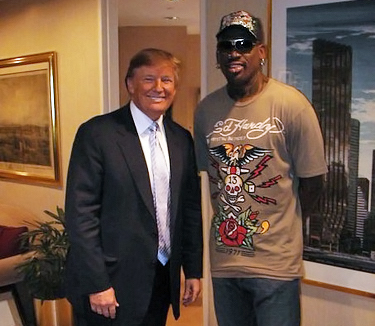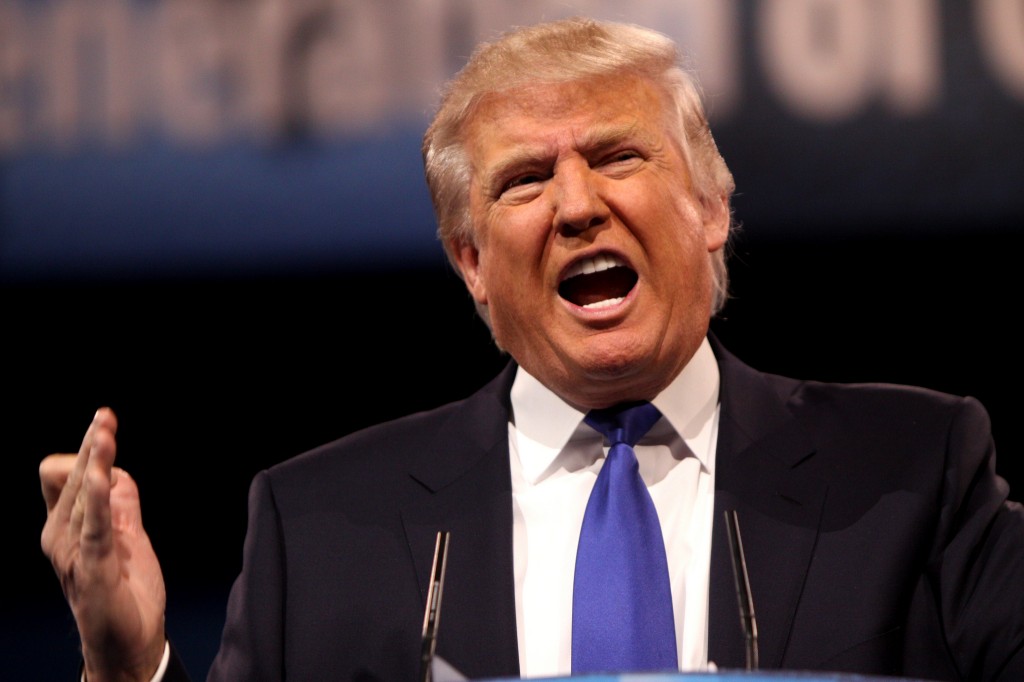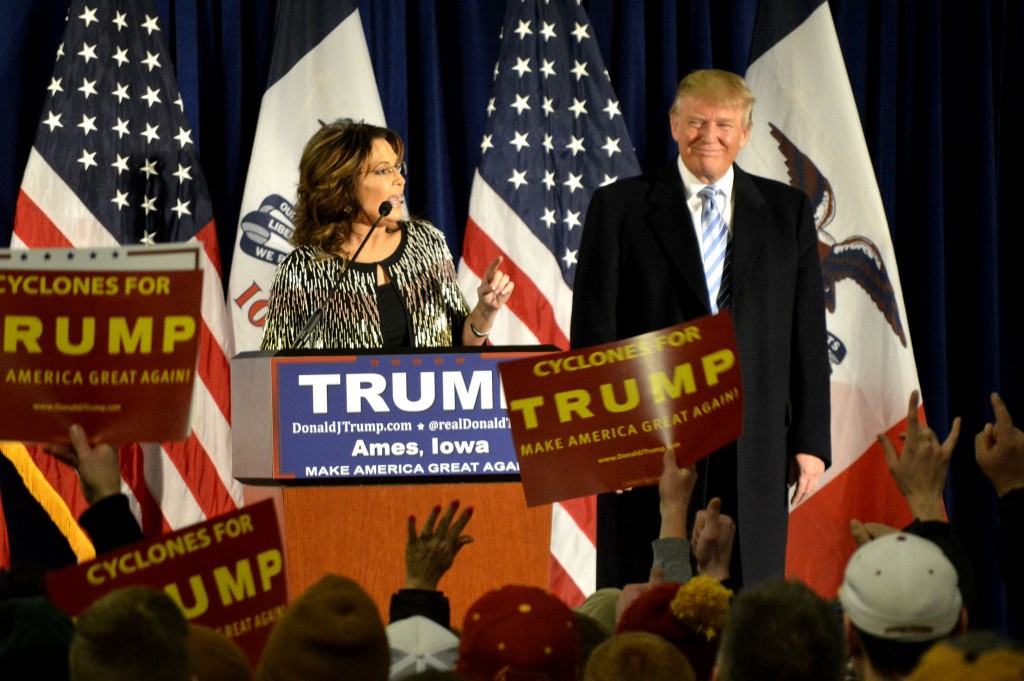Donald Trump’s racist, sexist, and xenophobic diatribes have provided ample fodder for tabloids and mainstream media alike. Pundits have eagerly covered the megalomaniacal billionaire’s presidential candidacy, updating their audiences with Trump’s latest and greatest insults. Trump’s campaign has morphed into a social media phenomenon, with his bellicose tweets offering instant gratification or exasperation. Nevertheless, amid the coverage of the latest poll numbers or the crowds at Trump’s rallies, not much attention has been paid to the candidate’s checkered political past.
Trump flirted with presidential bids in 1988, 2000, and 2012, and considered running for governor of New York in 2006 and 2014. Quite clearly, Trump’s political career has been predicated on bombast and media sensation. Underlying his bravado is a fiercely nativist message: his xenophobia, which has manifested most recently in proposed deportations of undocumented immigrants and a ban on Muslims entering the United States, can also be seen in his conspiracy theories about President Obama’s citizenship or in the protectionist trade tariffs that he has trumpeted (pun intended) for decades. Much has been made of Trump’s flip-flops on healthcare, reproductive rights, and gun control, but Trump has reiterated this anti-foreigner, “America first” mentality again and again. In 1987, he proclaimed, “The world is laughing at America’s politicians”; 24 years later, Trump declared, “This country is not great. This country is a laughingstock for the rest of the world.” Now, he promises to “Make America Great Again,” garnering the same media attention and free brand promotion that he always seems to get. The only difference this time is that Trump’s chauvinism might win him the Republican nomination instead of better ratings for The Celebrity Apprentice.
The 1988 election: The Trump Phenomenon begins
In 1987, Trump toyed with the idea of running against George H.W. Bush for the Republican nomination. Mike Dunbar, a prominent Republican power player from Portsmouth, N.H., organized a “Draft Trump” effort earlier that summer. Media outlets drooled over the possibility of a Trump candidacy, running a series of articles on whether the billionaire would throw his hat in the race. Trump fueled the “will he or won’t he” frenzy, taking out advertisements in newspapers across the country. The ads lambasted President Reagan’s negotiations with OPEC and Japan, stating, “There’s nothing wrong with America’s Foreign Defense Policy that a little backbone can’t cure.”
In October, Trump flew his private helicopter to New Hampshire, disembarking and then taking a stretch limousine to the Portsmouth Rotary Club. Five hundred dedicated supporters applauded Trump as he laid out his foreign policy platform: “Whatever Japan wants, do the opposite.” Trump lampooned America’s diplomatic efforts and emphasized that America should tax trade with the Asian economic powerhouse, remarking, “The Japanese, when they negotiate with us, they have long faces. But when the negotiations are over, it is my belief—and I’ve never seen this—they laugh like hell.” Trump made similar comments about Kuwait and Saudi Arabia, asserting, “They’re ripping us off left and right.” Although Trump told the crowd that he would not seek the nomination, he remained in the public limelight. In November, perhaps taking advantage of the media hype, he released his best-selling The Art of The Deal, which Trump famously dubbed his “second favorite book”, (next to the Bible, of course).
Trump continued to promote his protectionist tariffs in the months to come. Appearing on the Oprah Winfrey Show in April 1988, Trump affirmed, “I’d make our allies pay their fair share. We’re a debtor nation … you can’t keep going on losing $200 billion.” In typical Trump fashion, the billionaire blustered, “I have tremendous respect for the Japanese people. I mean, you can respect somebody that’s beating the hell out of you.” When Oprah, whom Trump has frequently called his preferred vice-presidential running mate, asked whether Trump was interested in ever running for president, he demurred, “Probably not.” Trump smiled, then went on to clarify, “I do get tired of seeing the country get ripped off … I think I’d win. I’ll tell you what: I wouldn’t go into lose.”
Trump Considers an Independent Candidacy in 2000
Trump abruptly left the Republican Party in the fall of 1999, calling conservatives “just too crazy right.” That October, the real-estate mogul announced he was forming a presidential exploratory committee, fueling speculation that he would run under the Reform Party. Although some members of the Reform Party bristled at Trump’s loose commitment to the Party’s strict fiscal conservatism, Trump won crucial support from Minnesota Governor, prominent Reformer, and former wrestler Jesse Ventura. As the election cycle heated up, Trump appeared on several television talk shows and drew crowds across the country. Trump pitched himself as America’s White Knight, alleging that “Washington is in gridlock and nothing is getting done. No health care reform, no tax relief, no campaign finance reform … I think it will take a nonpolitician to break the logjam.” The billionaire underscored that he was not beholden to special interests and was willing to spend millions of his own fortune in order to win the White House. Sound familiar?
Like he did in 1988, Trump promised that he would renegotiate free trade agreements and “end the rip-off of America by our allies.” Likewise, Trump warned, “Let’s be extremely careful not to admit more [immigrants] than we can absorb.” However, the idiosyncratic New Yorker also laid out several liberal policies, including universal healthcare, restrictions on assault weapons, access to abortions, and a one-time, 14.25 percent net worth tax on the superwealthy (including himself). In addition, Trump called for a “greater atmosphere of tolerance,” seemingly antithetical to his current anti-PC polemics. Trump criticized Pat Buchanan, his main challenger for the Reform Party nomination, as a “Hitler lover” who discriminated against Jews, blacks, gays, and Mexicans and wanted to “divide Americans.”
At the end of 1999, Trump started to gain steam, taking the lead in several polls of Reform Party voters and fleshing out a potential cabinet that included John McCain as Secretary of Defense, Colin Powell as Secretary of State, the Democrat Charles Rangel as Secretary of Housing, and of course, Oprah as vice president. Moreover, Trump turned the increased media attention into easy money, conveniently publishing another book, The America We Deserve. In classic Trump style, he advertised the exposition with an irresistible, Tabloid-esque hook: “Donald Trump for President? Run or not, Donald Trump’s ideas will have a major impact on the next Presidential election.”
By the start of the new millennium, however, Trump’s campaign had fizzled out. Examining Trump’s failed 2000 bid, Washington Post reporter David Weigel noted, “A lonely nation cried out for blandness, and demanded candidates with smart ideas of how to spend budget surplus.” Trump’s unconventional ideas and braggadocio caused ardent Reformers to view his campaign as nothing more than a celebrity stunt; his hyper-nationalist cries fell on deaf ears. In February 2000, Trump decided against running, pointing to petty political in-fighting within the Reform Party. Trump maintained that a Reformer could not possibly win a general election, accentuating that he was “not looking to get 20 percent of the vote.” It is doubtful whether Trump would have even done that well: a CNN/Time national poll showed Trump only at 7 percent, with Bush and Gore well ahead. American voters were not yet ready for the Donald.

Trump with basketball star Dennis Rodman on the set of Celebrity Apprentice. Trump was criticized for using his possible presidential campaigns as a way to boost the ratings of his show.
Trump Leads the Birther Movement
In 2004, Trump announced he was “very seriously” considering a presidential campaign, but he ultimately decided to host The Apprentice instead. Two years later, Trump mulled whether to run for Governor of New York. As per norm, Trump reveled in the widespread media attention and brand promotion before putting the rumors to bed. Shortly after Trump passed on a 2008 campaign, media outlets were already beginning to hype a potential Trump candidacy in 2012. Still, many doubted the tycoon’s intentions. Former New York City mayor Ed Koch observed, “He’s using this idea of running, milking it, for all it’s worth—and it’s worth a lot.” What else would distinguish Trump Natural Spring Water from any other bottled water? Why else would anyone buy Trump’s colognes (“Empire By Trump” for those who want “to create their own empire” and “Success by Trump” for those who want “the spirit of the driven man”)? Even though Trump stressed, “I don’t need to do this for ratings on the Apprentice,” the show’s viewership noticeably increased as he pondered a presidential campaign.
In the early months of 2011, Trump showed some signs of mounting a real candidacy, delivering a fiery keynote address at the Conservative Political Action Conference. Trump proclaimed, “China gets away with manipulating their currency and stealing our jobs. I have dinner with and know many Chinese businesspeople, and they cannot believe what they’re getting away with.” Trump later went on to gloat, “I understand the Chinese mind.” Likewise, Trump boasted that he would force South Korea to “pay us for protection” from North Korea. Similarly, Trump argued, “Countries like China, like India, South Korea, Mexico and the OPEC nations view our country as weak and ineffective.” In what was dubbed “Trump’s f-bomb tirade,” the billionaire shouted that OPEC wants to “raise the price of oil because we have nobody in Washington that sits back and says you’re not going to raise that f-ing price.”
However, Trump did not dominate the headlines because of his protectionist trade policies; rather, his scathing ad hominem attacks on Republican and Democratic leaders alike provided constant entertainment. Trump denounced George W. Bush and fellow Republican candidates Mitt Romney and Ron Paul as terrible policymakers. Trump saved his most hostile remarks for President Obama. Not only did the Donald disparage Obama’s negotiating skills (obviously, Obama has not read “The Art of the Deal”), but he also persistently questioned whether the President was born in the United States.
Trump, who identified himself as a Tea-Partier, tapped into a groundswell of anti-Obama fervor. As Obama’s approval rating dropped from 50 to 46 percent over the first four months of 2011, Trump surged to the top of the Republican pack. In February, Trump trailed Obama by only two points in a head-to-head Newsweek/Daily Beast poll. Nonetheless, Trump quickly came crashing back down to Earth. President Obama released his long-form birth certificate, dismissing Trump’s cries of conspiracy. At the White House Correspondents’ Dinner, President Obama and comedian Seth Meyers mercilessly made fun of Trump’s crackpot claims. The billionaire scowled and looked off into the distance. Moreover, Obama’s approval rating soared to 51 percent in early May after the killing of Osama bin Laden. Trump’s critiques of the president’s foreign policy lost significant credibility. Subsequently, a PPP poll showed Trump tied with Ron Paul for fifth place at 8 percent, down from 26 percent just a month earlier.
In a trip to New Hampshire on May 11, Trump complained, “I had no idea I would get hammered in the way I’ve been hammered the past few weeks.” Five days later, Trump suspended his campaign, although his resignation speech was not without his typical swagger. Trump professed, “This decision does not come easily or without regret; especially when my potential candidacy continues to be validated by ranking at the top of the Republican contenders.” The ever-humble Trump went on to state, “I want to personally thank the millions of Americans who have joined the various Trump grassroots movements.” Trump eventually endorsed Republican nominee Mitt Romney, even sharing the stage with him at several rallies. Additionally, Trump once more converted free media exposure into dollars, accepting millions from NBC to remain the host of Celebrity Apprentice. In December 2011, Trump released another compendium of his policy stances, entitled Time to Get Tough: Making America #1 Again.
Crippled America: Trump’s Success in 2016
Trump hinted that he might mount a campaign against Andrew Cuomo for Governor of NY in 2014, but not everyone bought into the Donald’s publicity machine. Journalist Brett LoGiurato predicted, “If history is any indication, Trump will string out his gubernatorial “aspirations” for as long as is feasible, and then decide against a run.” LoGiurato was exactly right. In January, Trump said there was a “50-50” chance that he would run, commenting, “I believe—and many people believe—I’m the only Republican who can win.” Despite Trump’s ostensible support, however, the billionaire backed away from a bid and Cuomo was re-elected in a landslide.
Thus, when Trump announced a presidential exploratory committee for 2016, many were skeptical. Kyle Smith of the New York Post asserted, “Among obnoxious billionaires of America, Donald Trump has the same chance of being elected president as Donald Sterling.” The Huffington Post was perhaps most dismissive, initially consigning Trump to its Entertainment section (Trump coverage was switched over to the Politics section in December). Unlike his past flirtations with the Oval Office, though, Trump filed the necessary FEC paperwork and officially announced his 2016 campaign in June. During his announcement speech, the real-estate developer reiterated his nativist trade message, declaring, “The U.S has become a dumping ground for everyone else’s problems … China has our jobs. Mexico has our jobs.” Then, Trump’s xenophobia turned into overt racism, nonchalantly pronouncing that Mexican immigrants are “bringing drugs, they’re bringing crime, they’re rapists, and some, I assume, are good people.”
Instead of dooming his campaign, the Donald’s controversial comments about Mexicans, Muslims, and McCain have apparently vaulted Trump to the top of the Republican polls. In the past six months, his favorability ratings have increased from 25 to 39 percent. On the stump, Trump still advocates protectionist tariffs, including a 35 percent tax on vehicles manufactured outside of America. Consistent with his rhetoric from 2011, the number one issue on his website is “U.S.-China Trade Reform.” However, Trump’s sudden rise is attributable to much more than his anti-free trade invectives. After all, Trump had heralded protectionist trade policies in 1988, 2000, and 2012 to no avail.
Rather, Trump’s appeal is largely a case of being the Right’s man for the right moment. Tired of Washington’s so-called political correctness, conservatives have flocked to listen to Trump’s callous and jingoistic speeches. With Citizens United having opened the doors to unlimited campaign contributions, Trump’s ability to self-finance augments his freewheeling, tell-it-like-it-is mantra. Furthermore, at a time when Obama’s approval ratings are hovering in the mid-40s, Trump’s anti-establishment, anti-Obama message has been music to the Republican base’s ears. Conventional candidates like Jeb Bush have not been able to tap into Republican frustration. More recently, Trump has turned his wrath towards Ted Cruz, who has been steadily gaining momentum. Trump’s nativist attacks on the Canadian-born Senator’s eligibility bear striking resemblance to his previous attacks on President Obama’s citizenship.
While he was debating whether to run in 2000, Trump remarked, “I guarantee you this. If I do run, it won’t be boring.” Indeed, Trump’s trademark blend of celebrity, bigotry, and nationalism has given political pundits plenty to talk about leading up to the 2016 election. Nonetheless, by-and-large, the Trump phenomenon is nothing new. Ever since he emerged in the political scene in 1987, the billionaire has portrayed himself as America’s savior, as a non-politician who can get things done (and sell books and men’s fragrance along the way). He has always critiqued the governing establishment candidates, regardless of whether they are Democrats or Republicans. His political career has been predicated on a xenophobic blame game: first the Japanese, then the Kuwaitis, then the Saudi Arabians, then the South Koreans, then the Chinese, and now the Muslims and Mexicans. The question now is, who will be next?

